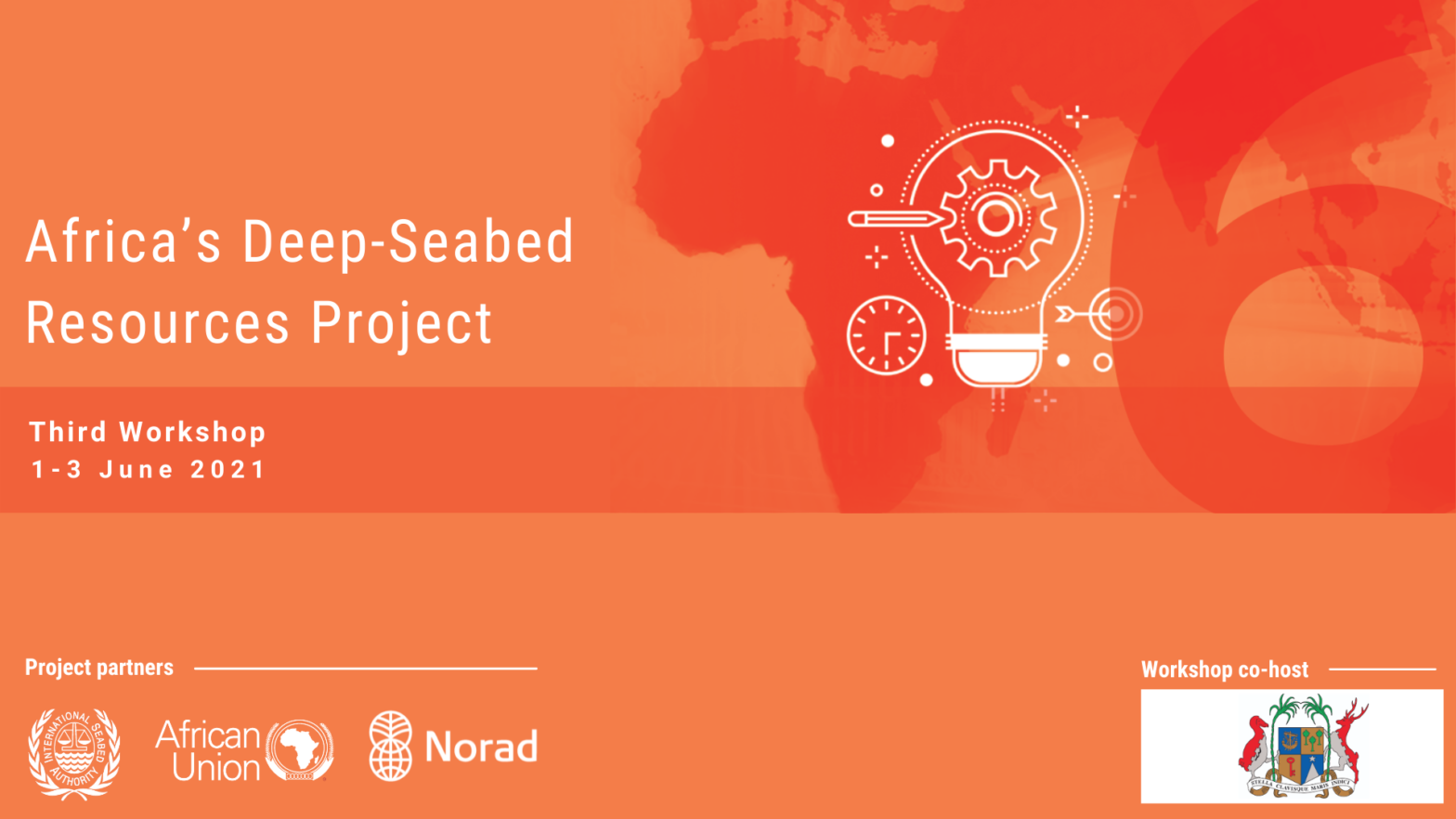The third workshop organized in the framework of the Africa Deep Seabed Resources (ADSR) project successfully concluded yesterday with increased understanding among participants of regulatory processes related to deep-seabed mineral resources exploration and exploitation – including environmental management practices and tools – and of potential benefits for African States of engaging in activities in the international seabed area (the Area).
The workshop, which took place virtually from 1 to 3 June 2021, was organized by the International Seabed Authority (ISA) in collaboration with the Government of Mauritius and with the support of the African Union and the Norwegian Agency for Development Cooperation (NORAD). About 170 representatives from 21 countries participated in the event, which targeted more specifically African countries of the Indian ocean region (Comoros, Kenya, Madagascar, Mauritius, Rwanda, Seychelles, Somalia and Tanzania). Representatives from competent international and regional organizations, contractors, non-governmental organizations as well as more than thirty-five former African trainees of ISA were also in attendance.
Addressing the participations, Ambassador Jagdish D. Koonjul, G.C.S.K., G.O.S.K., Permanent Representative of Mauritius to the United Nations emphasized the importance of the initiative. “Mauritius is pleased to have been able to co-host this very successful virtual workshop, which will undoubtedly be extremely beneficial to the large number of participants. We look forward to collaborating closely with ISA and the African Union for continued capacity-building events for our region and Africa,” he said.
In his opening remarks H.E. Mr. Michael Lodge, Secretary-General of ISA, noted that in recent years, the wealth of natural resources – including living and non-living resources – that are found in the oceans and seas surrounding the African continent has generated growing interest.
“The potential benefits that could be derived from sustainable development of deep seabed resources located on the continental shelves of African States and in the international seabed Area could be a key driver for the development of Africa’s blue economy. This strategic linkage is clearly established by the African Union in its 2050 Africa’s Integrated Maritime Strategy and Agenda 2063, and in the Africa Blue Economy Strategy,” he said. “ISA is therefore pleased to be working closely with the African Union and NORAD in the implementation of the ADSR project and that, in close collaboration with all African States, such dedicated activities are developed to ensure that their capacity development needs are effectively addressed,” he added.
H.E. Albert Muchanga, Commissioner for Economic Development, Trade, Industry and Mining at the African Union Commission (AUC), reiterated that sustainable exploration and exploitation of deep-seabed resources require a robust strategy to harness the potential benefits.
In this regard, H.E. Albert Muchanga called upon ISA to partner with AUC and the African Minerals Development Centre in the development and implementation of such strategy, adding that “The African Union Commission is looking forward to strengthening and consolidating the strategic partnership with the International Seabed Authority in deep-sea mineral resources development, marine scientific research and technology as well as specialized training of our young researchers.”
The high-level segment concluded with the participation of Norway’s State Secretary, Mr. Jens Frølich Holte who stressed the importance to “continue to advance the application of the precautionary approach and protection of the environment with regard to all activities in the Area. Long-term benefits, including long-term commercial benefits, are only possible within a framework that is environmentally sound and sustainable.” “The main purpose of the ADSR Project corresponds well with the mandate of ISA. It also corresponds with Norway’s aim to cooperate with other States to make it possible to utilize rights and obligations under UNCLOS to improve development. Therefore I wish to take this opportunity to confirm Norway’s support to this initiative and to ISA in general. We are proud to have been part of an effort that has already achieved astonishing results,” he added.
Over three days, the participants discussed the regulatory framework for exploration and future exploitation of deep-seabed mineral resources in the Area, key international instruments for the effective protection of the marine environment as well as critical ongoing processes such as the development of regional environmental management plans, the provisions for the equitable sharing of economic and non-financial benefits derived from activities undertaken in the Area, the legal regime governing marine scientific research activities in the Area, technology development and the dissemination of environmental data. The workshop also addressed the fundamental issue of priority capacity needs of African countries in the fields of deep-sea exploration, marine scientific research and marine technology.
African States make up 47 of the 168 Members of ISA. Nine African States currently sit on the Council of ISA and six African experts are members of the Finance Committee or the Legal and Technical Commission. Nevertheless, Africa remains the only regional group that has not yet taken full advantage of the provisions of the United Nations Convention on the Law of the Sea (UNCLOS) to take part in deep-sea mineral exploration.
The ADSR project was launched following ISA’s Voluntary Commitment (#OceanAction16374) registered at the United Nations Ocean Conference in 2017 together with the African Minerals Development Centre of the African Union to support Africa’s blue economy. The project is led by ISA and implemented in partnership with the African Union and the Government of Norway, through NORAD. It foresees the organization of five subregional workshops across the African continent. The first workshop took place in Abidjan, Côte d’Ivoire in October 2018 and the second workshop, took place in Pretoria, South Africa in May 2019.
Through the ADSR project, ISA aims to enable African States to take full advantage of the provisions of UNCLOS and to equip them with the knowledge required should they decide to engage in activities in the Area.
For media enquiries, please contact:
Ms. Stefanie Neno, Communications Specialist, ISA, sneno@isa.org.jm
For more information on the ADSR project, please contact:
Ms. Marie Bourrel-McKinnon, Senior Policy Advisor and Special Assistant to the Secretary-General, ISA, m.bourrel@isa.org.jm
—————
For more information visit our website www.isa.org.jm or follow us on Twitter @ISBAHQ


